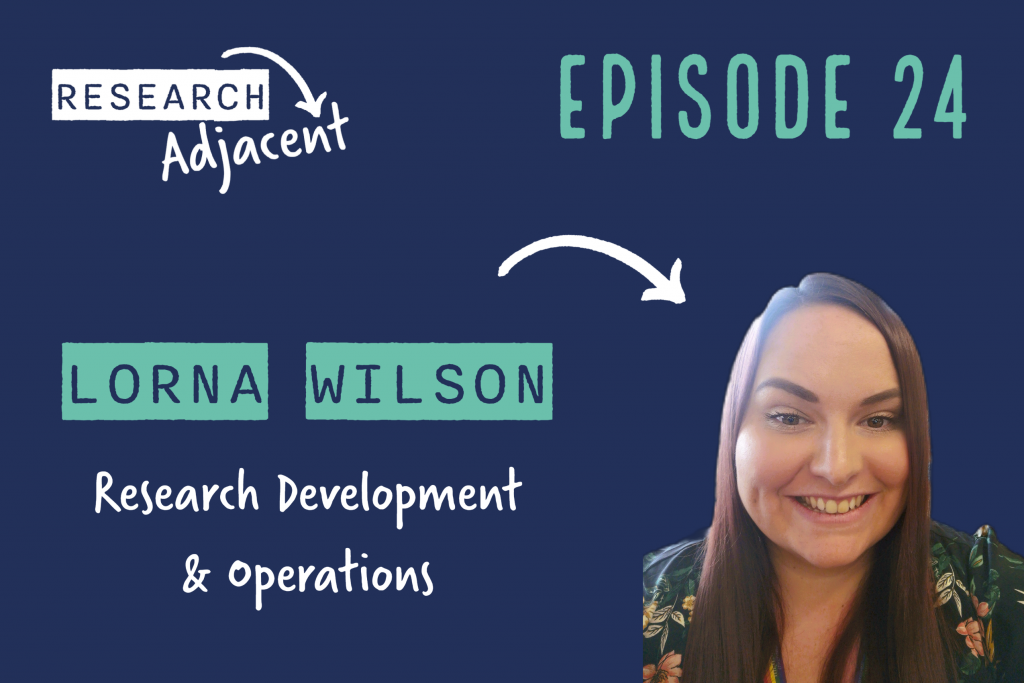Lorna Wilson (Episode 24), Research Development and Operations | Lorna is leading research development and research developers

For this episode of the Research Adjacent podcast Sarah is talking to Lorna Wilson, Director of Research Development and Operations at Durham University.
In this role Lorna is responsible for supporting large strategic projects, as well as leading the team that manages research funding once it has been awarded. On top of that she has just taken over as Chair of ARMA (the Association of Research Managers and Administrators)!
From temp to the top
Like so many research-adjacent professionals, Lorna came into this work completely accidentally. After completing a Masters in Sociology she turned up at a temp agency looking for work and was offered a job at the Newcastle University – the very place where she had just been a student. She moved around trying a number of university jobs before landing in a faculty role which got her more involved in research. A supportive boss, also called Lorna, encouraged her to get more involved and ultimately apply for a funding advisor role which set her on her current path.
“At the time I was told was I got offered the job because I was enthusiastic about it. And they thought they would give me the opportunity and I have not looked back since then. I have really benefited from having some really great people around me to help in terms of developing those transferable skills and being able to access those opportunities.”
Adding value to research
A central part of Lorna and her team’s work is helping develop funding applications. Their contributions they make vary from budgets and resourcing, to concept development and coaching.
“And someone might come to you and be like, ‘Oh, I’m not quite sure I had this random thought in the middle of the night’. And the next thing you know, you’ve got a three million pounds consortium together to deliver this really exciting initiative”
Lorna has fond memories of some big proposals that she has worked on, particularly the ones where her expertise was recognised and valued. Not everyone ‘gets it’ though, and inevitably there are times when researchers either don’t seek support or don’t take that advice on board.
“We see hundreds and thousands of successful and unsuccessful proposals. And it is disappointing that sometimes that’s taken for granted or it’s not recognized. I think we have a responsibility there. I think we need to get better at talking about the added value and what we can do.”
When it comes to talking about the added value that research-adjacent professionals can bring to research, Lorna is well placed to influence research culture. ARMA has been an enthusiastic participant in the research culture conversation. They conducted their own study into the experiences of ARMA members, and despite finding many areas for improvement, they found that members were keen to contribute and make things better.
“We all have a part to play in research culture. You do not have a positive research culture if your research professional staff are not part of that.”
Learning to lead
It is perhaps no surprise that Lorna has stepped up to become Chair of ARMA as the organisation has played a pivotal role in her own career. She began with an ARMA induction session when she first took on a research facing job and her involvement has steadily grown since. From delivering training, to joining special interest groups and eventually the board, she has always been an enthusiastic member. For Lorna the most important benefits have been building a network and access to development opportunities, benefits she want to extend to more junior colleagues or those working in smaller teams.
“We’re always looking for people to get more involved. And you don’t have to be in a senior grade to go for some of these opportunities. If you’re interested, you’re passionate and you’ve got experience, that’s what matters. A lot of the time people hold back. I almost didn’t apply for the board because I thought I wasn’t senior enough.”
More collaboration, less competition
Given how much Lorna enjoys working with people and building networks, it’s perhaps not surprising that she would use her magic wand to reduce the sense of competition between higher education staff.
“Some colleagues will openly talk to each other about problems, about challenges, about opportunities, but there’s still a sense that some people hold back. And I just think things would be much better if everybody engaged in that open dialogue. It’s competitive enough to win funding. Us talking to one another will only benefit all of us.”
That, and just the small matter of sorting out university finances…you’ll definitely need a magic wand for that one, Lorna!!
Find out more
- Connect with Lorna on Twitter or LinkedIn
- Find out more about ARMA
- Read the ARMA Research Curture report
Theme music by Vitaliy Levkin from Pixabay
Join our gang! Sign up to our mailing list
Are you a current or aspiring research-adjacent professional? Or are you just research-adjacent curious? It doesn’t matter, everyone is welcome in our gang! Join our mailing list using the form below and you will receive podcast updates (of course) plus interesting articles, reports, career tips and resources. You can unsubscribe any time.
Pingback: Resilience (Episode 30)
Comments are closed.